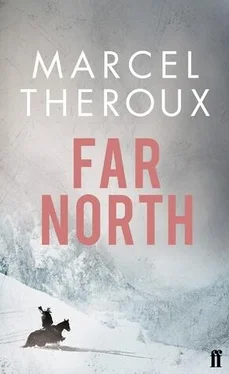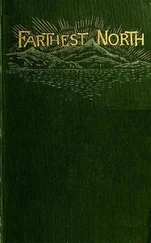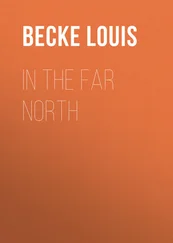*
We had Sundays free. There was some worship, but more drunkenness. The day I’m thinking of was a rainy day in July, which was the worst — hot and wet, and all of us stuck in our quarters making trouble. I was laying on my bed pretending to sleep when a guard came in and called my name.
That wasn’t in itself so unusual. From time to time people would be called out and told to bring their things. We didn’t know where they got sent, but we mostly didn’t see them again. No one ever refused, because of the chance you’d be made a guard.
I followed the man out, to
What had I expected? I don’t know. But the place I saw was not different from countless others that I had seen in the north or that we had passed on the march there two years before. It was another abandoned town, emptied out and overgrown.
After about fifteen minutes we reached a street of bigger houses, and this time there were signs of life in them. The yards were better kept and curtains hung in the windows. There were dogs barking — but not wild dogs, dogs with collars and chains.
I knew of this place, because in winter some of the prisoners would be marched out here to shovel snow. It was where Boathwaite and the guards had their homes. And the rumoured whorehouse was around here somewhere. This was the so-called town that our labour served.
The guards led me to the rear of the biggest house on the street. It was ugly enough, built out of a kind of liverish brick, with no real shape to it, but it was a grand size, and big-boned.
I complimented one of the guards on the house, knowing it wasn’t his, but wondering what he would say.
He said nothing at all, just looked awkward, spat through his teeth, and scuffed it in with the toe of his boot.
‘You’re to work here this afternoon,’ said the other, cutting in to shut up any more of my questions.
I looked around the yard. It was unkempt and gloomy.
‘What kind of work?’ I asked.
‘This garden. You’re to make it like the one behind the barracks.’
I kicked at the patchy turf. There was the makings of a lawn and some beds, but a lime tree at the far end was throwing shadow over the whole place. ‘It can’t be done,’ I said. ‘It’s too dark. The tree’s robbing light. The best I could do would be to stick in a few bulbs, but there aren’t any.’ It was the way I’d learned to be since coming in there: on principle, we dug our heels in when there was work to be done. I didn’t want to let on what I was really feeling, standing on the brink of work I could do alone, and who knew what other privileges.
The lead guard said the other one would fetch me what I needed, so I told him to get me a rake, and a spade, and a barrow if he could find one.
The two of us waited about fifteen minutes until the other fellow showed up with a bunch of tools and a sack in place of a barrow and I set to work.
*
From then on, my days took a whole different pattern. I worked with the prisoners in the morning, but two or three times a week, the guards came in the afternoon to collect me for my work in the garden. The guards’ names were Zhenia and Abelman. They watched over me while I was working, but though I was never entirely alone, it still felt like a taste of solitude.
Zhenia was the junior guard who wassent on errands, and once in a while helped me wrangle a tree root out of the ground or carry cut branches while Abelman kept an eye on me. They were fierce and aloof inside the palisade, but once out they grew easier with me and occasionally made small talk about the weather, or complimented my work. Abelman was a city fellow, but Zhenia was a country boy and he understood what I was doing.
My new duties also meant small freedoms inside the prison compound. I persuaded Abelman I needed a half-moon spade to edge the turf right. First it appeared there was no such thing to be had; then, when I drew him a sketch of what I wanted, he brought me one, but it had been badly made and broke apart the first time I used it. I showed him there was a cold shut in the blade and said that I could make a better one myself, if he would just let me into the smithy.
The smithy was outside the palisade and was under constant watch because of what the prisoners could get up to there if they had a mind to.
It was a time before he gave me an answer, but after a wait, he came back with a yes.
From then on, I made my own tools when I needed them, and I enjoyed the work in the smithy almost as much as the solitary toil in the garden. I think, too, that the prison smiths, who were a kind of nobility among us, were impressed by the skills I had picked up from all those years swaging my own bullets, and their good opinion of me made life easier in the barracks.
I knew there would be less to do in the winter months, so I saved myself jobs to last me through to spring: I talked them into letting me fell the lime, I cleared brush from around the edge of the garden, and I worked up tools for the planting season — anything to keep me out of the barracks and working on my own. The labour I spent on that garden kept me sane.
Now and again, while I was working there, I noticed someone in the house watching. I’d hear voices, too — women’s voices, and the quick scattering sound of feet in the house. But the strangest thing was this: one day in the fall, when I had stayed longer than usual, and I was gathering up my tools in the half-dark, I heard a humming sound. I turned around, and the windows of the house were blazing with yellow electric light.
*
In March the garden burst into life. It felt like winter had passed in a heartbeat. That was good for me, because spring meant more solitary work in the garden, but it made me think how things had altered.
Seeing the flowers in that garden bloom so early, and the trees bud so much sooner than they ought, it struck me that a change had happened deep down in the fibre of things, and it put me in mind of the Tungus who said the world needs to sleep through the winter, or it wakes angry, like a shatoon , and tears up everything in its path.
*
Through spring and summer, I cut the grass of the lawn every other day with a push-mower. It was old and rusty and the devil to roll. In the July heat, with all the bugs out, it was hard work, and I’d break from time to time to mop my face with a rag. It doesn’t hurt me, but the salt in sweat makes my scarring flare up worse.
More and more, it was one or other of the guards, but not both of them. Today it was Abelman, who I liked less, leaning up agains the wall of the kitchen, his gun on his lap, and using a twig to tease the house-cat.
I heard the slap-bang of the screen door opening, and suddenly Abelman shuffled to his feet, all simpering and friendly, like a dog that can smell sausages.
There was a little girl of about ten stood there in a blue check dress holding a glass of water.
She handed me the glass. She was brave enough not to startle when she saw my face, but her hand shook a little as she lifted the glass, and something clinked in it.
‘We’ve got a refrigerator,’ she said.
The water was almost too cold to drink. The ringing came from the ice cubes bobbling against the sides of the glass.
‘Are you a boy or a girl?’ she said.
I sipped the water. She was a pretty thing, not a tomboy like me. ‘I’m a girl,’ I said.
‘What happened to your face?’
‘Isn’t it rude to be always asking questions?’ I said.
‘Do you want some more ice?’
‘Yes, please.’
She came back out of the house with a whole tray of icecubes. I had to help her break them out of there. The metal was furred with ice-crystals, and it stuck to the wet on my hand. When the cubes were free, she handed them to me and Abelman like candy. Abelman held his in his hand until they melted and dripped out.
Читать дальше












